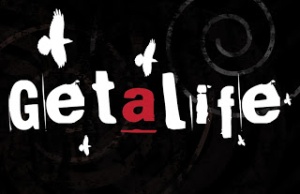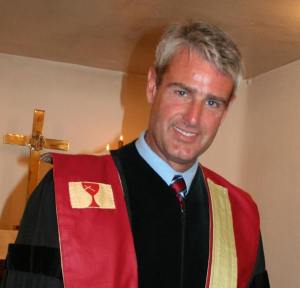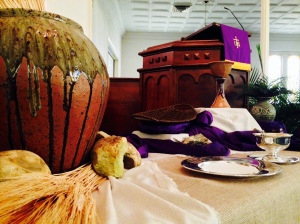I know it is way too early to mention Christmas in a sermon. However, the following is the best sermon illustration that I could come up for this morning’s scripture lesson.
Every Christmas, when my whole family gathered at the home of my grandparents for Christmas dinner, and more importantly, for presents, my brother, sister and I could always count on getting some cool presents. For just about everyone to give us some kind of special toy that we could play with for hours at a time.
However, we always could count on this particular relative to give us something that we could never play with, something like a pair of socks, a pair of gloves, or a set of handkerchiefs. When I was in the first grade, I remember getting what every six-year-old boy wanted: a bottle of Jovan Musk for Men. The next year, I got every seven-year-old’s favorite gift: a box set of Brut 33 Cologne and Deodorant. And the next year, I got every eight year-old’s dream-come-true: Some Soap on a Rope.
And every year, I remember always opening my present from this one particular relative, smiling and saying: “Thank you. This is exactly what I wanted.” Because Mama and Daddy would always pull us children aside every Christmas and tell us to always remember that it is not the present you get, but it is the thought that counts.
To this day I have never really fully understood that philosophy. What did my parents mean that “it was the thought that counted?” I could not play with my relative’s thoughts. Besides, you have to wonder: soap on a rope for eight-year-old? What were they thinking?
“It is the thought that counts.” It is a common phrase, because often times, although we may not like it and may not fully understand it, we know it to be true. It is true at Christmas time, on birthdays, Mother’s Day and Father’s Day, but it is also true in other areas of life.
Sometimes in life the thought counts, because the thought is all that we have to offer. Sometimes we encounter situations where there is nothing that anyone can actually do, and the only thing that anyone can say is: “I am thinking about you.”
One of the most difficult things to do is to try to buy a card for someone who has a terminal illness. I remember trying to find a card for my grandparents during the last days of their lives. Most all of the cards read: “Hope You Feel Better” or “Get Well Soon.” And that’s not always appropriate. The only cards I found which best met my grandparents’ needs were cards which simply read: “I’m thinking of you” or “You are in my thoughts.”
There are some situations in life when the only thing we have to offer, and the very best thing we can offer, is our thoughts. Sometimes the greatest gift in the world can be those beautiful, empathetic, and comforting words, “I’m thinking about you.” Sometimes, the thought really does count.
Empathy is certainly one thing that is needed in this world. How much better would this world be if more of us thought before we spoke, before we acted? How much better would this world be if more of us tried to put ourselves in the shoes of another? There would certainly be much less hate in this world, much less bigotry, prejudice and stupidity.
I can remember many times in my life when I would have much rather received someone’s thoughts instead of the gifts they tried to give me. When sorrow and grief came my way, good-hearted people, I am certain without thinking, offered painful and insensitive antidotes like: “Well, the Lord knows best.” “You are just not ready to be a father.” “God doesn’t make mistakes.” “It’s God’s will, and we can’t question God.” Why couldn’t they just say: “I’m thinking about you,” and nothing else. Sometimes, not only does the thought count, the thought is the only thing that counts.
However, we must also understand that sometimes in life, the thought does not count. Sometimes, thoughts mean very little, and sometimes the thoughts mean nothing at all.
The apostle James, throughout his letter, makes this very clear. “Be doers of the word and not just hearers; otherwise, it is like looking in a mirror and immediately forgetting what you look like.” In other words, the look didn’t count. And in the next chapter he writes:
What good is it, my brothers and sisters, if you say you have faith but do not have works? If a brother or sister is naked and lacks daily food, and one of you says to them, ‘Go in peace; keep warm and eat your fill,’ and yet you do not supply their bodily needs, what is the good of that?
James is saying that sometimes the thought, no matter how good that thought might be, simply does not count. Sometimes good thoughts must be coupled with good deeds. Faith must be coupled with works. James says that if a person is hungry, all of the good thoughts in the world are not going to fill him up. Only food will do that. Thoughts are nice, but thoughts cannot keep a person warm. Only clothes will do that.
In Second Timothy, we can find a great example where thoughts are of little help. Paul writes to Timothy:
Do your best to come to me soon . . . and when you come, bring the cloak that I left at Troas, and also the books, and above all, the parchments . . . Do your best to come before winter.
It is obvious that what Paul does not need here are some thoughts. Paul appears to be lonely and would like some company. Paul is cold and needs a sweater, especially before winter. Paul appears to be bored and needs a book. Imagine if Timothy would have written Paul back and said, “Dear Paul, I cannot come and bring your sweater, and I cannot come and bring your books, but please know that I am thinking about you.”
You know, one of the greatest things about First Christian Church is that we have a lot of good thinkers. We have critical thinkers, philosophers, if you will, but we also have some very empathetic thinkers. Our church is full of compassionate thoughts. When the thoughts counted for some of you in the hospital, in the nursing home or in the funeral home, you always knew that there were people who were sincerely and lovingly thinking about you. And it counted for a lot.
However, there are just as many instances in the church where our thoughts simply do not count.
When Carolyn Joyner suffered a stroke six weeks ago, the most compassionate, most empathetic thoughts in the world were not going to build her the handicap ramp she needed. Hammer, nails, lumber, and people who were willing to give up a beautiful Saturday morning were needed to do that.
Since I have been your pastor, we have been thinking, at least I have been trying to get us to think, about how wonderful it would be if every member of this church volunteered to serve on some ministry team. We have thought about the tremendous impact we could have on eastern NC, our region, and our world, if every one of us were using his or her Spirit-given gifts for ministry. Thinking about it though, will not impact a thing.
If this church is ever going to become the church that God wants her to become, we must be willing to move beyond our thoughts to work hard and sacrifice much. Each of us must be willing to give of ourselves, of our tithes, but also of our time and our talents.
There are a couple of families in our church who have not worshipped with us for some time. I have missed them. And I know you have missed them. However, missing them, thinking about them, no matter how sincere our thoughts may be, will not let them know that they are missed. They need a phone call. They need a card sent to them, not thoughts kept to ourselves.
Sometimes thoughts do count. Sometimes saying, “I’m thinking about you,” is all we can offer, and it is all we should offer. Sometimes those simple, beautiful words can make all the difference in the world. However, as James and Paul teach us, sometimes in life the thought simply does not count.
Jesus constantly said that our thoughts should be put into action. Jesus said that if we truly loved him, we would do more than just think about him with sentimental affection. Jesus said that if we loved him, we would keep his commandments.
Sometimes I do believe that it is appropriate to think about Jesus. Part of our worship should be spending time in meditation reflecting on Christ’s love for us. How he loved us so much that he suffered for us. Those are things that we should think about. But I have to believe that if that is all that we do, then those thoughts simply do not count. They are like looking in a mirror and, a minute later, forgetting what we saw.
During our worship, when we reflect on the suffering of our Lord, when we hold the broken bread and the cup, those thoughts should always stir us, move us and mobilize us to go out and suffer alongside someone who is suffering. Thinking about our Lord should compel us to visit the nursing homes, the funeral homes, the hospitals and the prisons. Thinking about Jesus’ suffering should propel us serve on a ministry team, to be more committed than ever to truly be a movement for wholeness in this fragmented world.
A movement. Not a team of thinkers.
A movement. Not philosophy class.
A movement. Not a club of theorists.
A movement. Not a group of day dreamers.
A movement. Not a church of well-wishers.
A movement, a body of doers, doing all that we can, when we can, with all that we have been given,
working for wholeness in a creation that is broken,
working for justice in systems of inequality,
working for mercy and grace in a society of bigotry and prejudice,
working for peace in a culture of war and violence,
working for truth in a nation of politics,
working for love in a world of hate,
working for hope in a world of despair.
Now, may God give us the wisdom and the courage to do more than to just think about this sermon.










